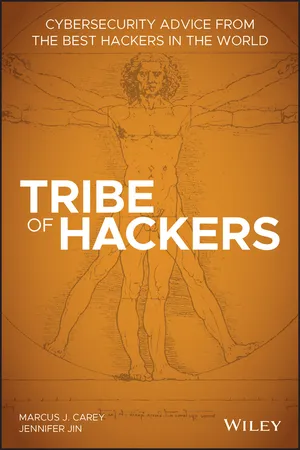
Tribe of Hackers
Cybersecurity Advice from the Best Hackers in the World
- English
- ePUB (mobile friendly)
- Available on iOS & Android
Tribe of Hackers
Cybersecurity Advice from the Best Hackers in the World
About this book
Tribe of Hackers: Cybersecurity Advice from the Best Hackers in the World (9781119643371) was previously published as Tribe of Hackers: Cybersecurity Advice from the Best Hackers in the World (9781793464187). While this version features a new cover design and introduction, the remaining content is the same as the prior release and should not be considered a new or updated product.
Looking for real-world advice from leading cybersecurity experts? You've found your tribe.
Tribe of Hackers: Cybersecurity Advice from the Best Hackers in the World is your guide to joining the ranks of hundreds of thousands of cybersecurity professionals around the world. Whether you're just joining the industry, climbing the corporate ladder, or considering consulting, Tribe of Hackers offers the practical know-how, industry perspectives, and technical insight you need to succeed in the rapidly growing information security market. This unique guide includes inspiring interviews from 70 security experts, including Lesley Carhart, Ming Chow, Bruce Potter, Robert M. Lee, and Jayson E. Street.
- Get the scoop on the biggest cybersecurity myths and misconceptions about security
- Learn what qualities and credentials you need to advance in the cybersecurity field
- Uncover which life hacks are worth your while
- Understand how social media and the Internet of Things has changed cybersecurity
- Discover what it takes to make the move from the corporate world to your own cybersecurity venture
- Find your favorite hackers online and continue the conversation
Tribe of Hackers is a must-have resource for security professionals who are looking to advance their careers, gain a fresh perspective, and get serious about cybersecurity with thought-provoking insights from the world's most noteworthy hackers and influential security specialists.
Frequently asked questions
- Essential is ideal for learners and professionals who enjoy exploring a wide range of subjects. Access the Essential Library with 800,000+ trusted titles and best-sellers across business, personal growth, and the humanities. Includes unlimited reading time and Standard Read Aloud voice.
- Complete: Perfect for advanced learners and researchers needing full, unrestricted access. Unlock 1.4M+ books across hundreds of subjects, including academic and specialized titles. The Complete Plan also includes advanced features like Premium Read Aloud and Research Assistant.
Please note we cannot support devices running on iOS 13 and Android 7 or earlier. Learn more about using the app.
Information
1
Marcus J. Carey
“Even if an organization is compromised by a zero-day attack, the lateral movement, registry manipulation, network communications, and so on, will be apparent to a mature cybersecurity practitioner and program.”

Table of contents
- Cover
- Title Page
- Copyright
- Acknowledgments
- Introduction
- Chapter 1. Marcus J. Carey
- Chapter 2. Ian Anderson
- Chapter 3. Andrew Bagrin
- Chapter 4. Zate Berg
- Chapter 5. Cheryl Biswas
- Chapter 6. Keirsten Brager
- Chapter 7. Evan Booth
- Chapter 8. Kyle Bubp
- Chapter 9. Lesley Carhart
- Chapter 10. Lee Carsten
- Chapter 11. Whitney Champion
- Chapter 12. Ming Chow
- Chapter 13. Jim Christy
- Chapter 14. Ian Coldwater
- Chapter 15. Dan Cornell
- Chapter 16. Kim Crawley
- Chapter 17. Emily Crose
- Chapter 18. Daniel Crowley
- Chapter 19. Winnona DeSombre
- Chapter 20. Ryan Dewhurst
- Chapter 21. Deidre Diamond
- Chapter 22. Ben Donnelly
- Chapter 23. Kimber Dowsett
- Chapter 24. Ronald Eddings
- Chapter 25. Justin Elze
- Chapter 26. Robert Graham
- Chapter 27. Claudio Guarnieri
- Chapter 28. Ron Gula
- Chapter 29. Jennifer Havermann
- Chapter 30. Teuta Hyseni
- Chapter 31. Terence Jackson
- Chapter 32. Ken Johnson
- Chapter 33. David Kennedy
- Chapter 34. Michelle Klinger
- Chapter 35. Marina Krotofil
- Chapter 36. Sami Laiho
- Chapter 37. Robert M. Lee
- Chapter 38. Kelly Lum
- Chapter 39. Tracy Z. Maleeff
- Chapter 40. Andy Malone
- Chapter 41. Jeffrey Man
- Chapter 42. Jim Manico
- Chapter 43. Kylie Martonik
- Chapter 44. Christina Morillo
- Chapter 45. Kent Nabors
- Chapter 46. Wendy Nather
- Chapter 47. Charles Nwatu
- Chapter 48. Davi Ottenheimer
- Chapter 49. Brandon Perry
- Chapter 50. Bruce Potter
- Chapter 51. Edward Prevost
- Chapter 52. Steve Ragan
- Chapter 53. Stephen A. Ridley
- Chapter 54. Tony Robinson
- Chapter 55. David Rook
- Chapter 56. Guillaume Ross
- Chapter 57. Brad Schaufenbuel
- Chapter 58. Chinyere Schwartz
- Chapter 59. Khalil Sehnaoui
- Chapter 60. Astha Singhal
- Chapter 61. Dug Song
- Chapter 62. Jayson E. Street
- Chapter 63. Ben Ten
- Chapter 64. Dan Tentler
- Chapter 65. Ben Tomhave
- Chapter 66. Robert “TProphet” Walker
- Chapter 67. Georgia Weidman
- Chapter 68. Jake Williams
- Chapter 69. Robert Willis
- Chapter 70. Robin Wood
- Epilogue
- Bibliography
- End User License Agreement